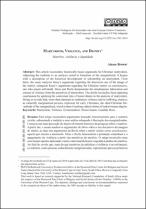| dc.contributor.author | Brown, Alease | |
| dc.date.accessioned | 2023-03-02T11:24:00Z | |
| dc.date.available | 2023-03-02T11:24:00Z | |
| dc.date.issued | 2019 | |
| dc.identifier.citation | Brown, A. (2019). Martyrdom, violence, and dignity. Estudos Teologicos, 59 (1) , 133-151. http://dx.doi.org/10.22351/et.v59i1.3618 | en_US |
| dc.identifier.issn | 2237-6461 | |
| dc.identifier.uri | http://dx.doi.org/10.22351/et.v59i1.3618 | |
| dc.identifier.uri | http://hdl.handle.net/10566/8497 | |
| dc.description.abstract | This article reconsiders historically based arguments for Christian martyrdom,
subjecting the tradition to an analysis suited to liberation of the marginalized. It begins
with a description of the historical development of scholarship on martyrdom. From
there, the essay analyzes Moss’s arguments regarding the discursive use of the image of
the martyr, alongside Recla’s arguments regarding the Christian martyr as autothanatos,
one who enacts self-death. Moss and Recla demonstrate the simultaneous fabrication and
erasure of violence from the narratives of martyrdom. The article reconciles these opposing
conclusions by applying the contextual lens of honor/shame to the analysis of martyrdom.
Doing so reveals that, more than attempts to emphasize violence and/or suffering, martyrs,
as culturally marginalized persons, represent for early Christians, the ideal Christian life-
-attitude of the marginalized, which is that of making radical claims of and to human dignity | en_US |
| dc.language.iso | en | en_US |
| dc.publisher | Escola Superior Teologia | en_US |
| dc.subject | Martyrdom | en_US |
| dc.subject | Violence | en_US |
| dc.subject | Religion | en_US |
| dc.subject | Culture | en_US |
| dc.subject | Humanity | en_US |
| dc.title | Martyrdom, violence, and dignity | en_US |
| dc.type | Article | en_US |

